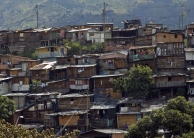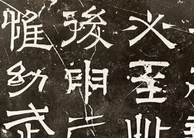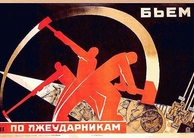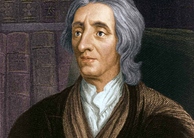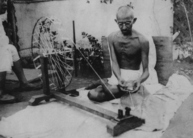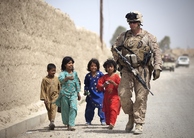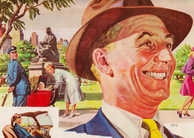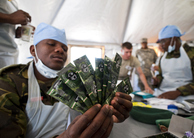|
2009 Volume 1 Issue 10
2009, Vol. 1 No. 10
Since 2000, the United States (U.S.) has devoted approximately 4.7 billion dollars in foreign aid to Colombia (Isacson 2006:1) with the dual aims of resolving Colombia’s internal conflict and of curbing the country’s role in the international... Read Article »
2009, Vol. 1 No. 10
Janet Malcolm opens her book, The Journalist and the Murderer,[1] with a stringent criticism of journalistic practice: "Every journalist who is not too stupid or too full of himself to notice what is going on knows that what he does is morally indefensible... Read Article »
2009, Vol. 1 No. 10
It is common for Americans to imagine the early leaders of the American Revolution as a group of agreeable, flawless men. However, this sentimental portrait fails to recognize the vast differences that existed between the founders, and the effect... Read Article »
2009, Vol. 1 No. 10
Just by flipping through television channels or walking through the aisles of a grocery store, it is easy to see that the popularity of “Green” and “Sustainable” lifestyles is growing everyday. With an impending energy crisis... Read Article »
2009, Vol. 1 No. 10
Henry Park: family man, father, son, husband, spy, traitor to his race, without race, ghost among the corporeal, in the wrong place, homeowner, homeless. Borne of nothing, self-cesarean, autochthon. Native speaker of the hyphen, begat on a plane... Read Article »
2009, Vol. 1 No. 10
Américo Paredes, in his 1971 article “The United States, Mexico, and Machismo” (Marcy Steen, trans.), defines the macho as “the superman of the multitude,” a “national type” by which Mexico, as a nation... Read Article »
2009, Vol. 1 No. 10
In Shakespeare’s King Lear, Poor Tom—a figure of madness, poverty, and linguistic play—acts as the personification of the semi-apocalyptic state into which the social world of the play descends. Edgar first appears fully as Poor... Read Article »
2009, Vol. 1 No. 10
American sport has become far more than contests with rules played on fields, diamonds, or rinks. Our current conception of sport is more than just a ball moving between groups of athletes, or a struggle for a finish line, or an effort to impress... Read Article »
2009, Vol. 1 No. 10
At the time of the incident, I was living … in the bush, hiding from the war. One day, I had gone to the fields to collect some food to eat. As I was cultivating, I heard someone screaming loudly and the next minute armed men appeared in... Read Article »
2009, Vol. 1 No. 10
Language use is a major factor in defining one’s cultural identity. People learn slang, lingo, jargon, idiomatic phrases, and other language tools, and with them participate in a cultural, social environment in which they can thrive. For ethnic... Read Article »
2009, Vol. 1 No. 10
Whether you noticed it or not, in 2008 Daylight Saving Time ended a bit later than normal. Though this is in fact the second year of the new Daylight Saving Time, or DST, schedule, many Americans are still not used to the new timeframe. DST now... Read Article »
2009, Vol. 1 No. 10
In 1950 the Associated Press polled close to 400 sportswriters in order to name the greatest male and female athlete of the first half of the twentieth century. For the men, a crowded field of legends including Babe Ruth, Joe Louis, Jesse Owens,... Read Article »
2009, Vol. 1 No. 10
The Tenth Circle of Hell: A Memoir of Life in the Death Camps of Bosnia, written by Rezak Hukanovic, is one survivor’s account of his experience during the war in former Yugoslavia. In a chronological manner, Hukanovic details events that... Read Article »
2009, Vol. 1 No. 10
Hisaye Yamamoto’s double-telling stories, according to King-kok Cheung, convey “two tales in the guise of one,” one woven from the explicit words of the narrator, the other from the softened and sometimes pointedly silent characters... Read Article »
2009, Vol. 1 No. 10
On January 1, 1994, the day the North American Free Trade Agreement, the great neoliberal experiment that tested the economic waters of the post-cold war world went into effect, the southern Mexican state of Chiapas was under siege. They came from... Read Article »
2009, Vol. 1 No. 10
In her article, “Amen and Hallelujah preaching: Discourse functions in African American sermons,” Cheryl Wharry examines the use of “sermonic expressions” by African American preachers to denote textual changes, to mark rhythm... Read Article »
2009, Vol. 1 No. 10
“News is something someone wants suppressed,” British newspaper baron Lord Northcliffe once said. “Everything else is just advertising.” This point is especially true in war journalism where every story, be it a heart-warming... Read Article »
2009, Vol. 1 No. 10
The terms holistic medicine, alternative medicine and complementary medicine have often been used interchangeably. In fact, alternative medicine and complementary medicine are different and holistic medicine is a term which tends to embrace the... Read Article »
2009, Vol. 1 No. 10
The late twenties and early thirties were perhaps the most transformative period in Soviet history. It was during this period Stalin consolidated his grip on power and was allowed to rule with impunity, instituting his “revolution from above... Read Article »
2009, Vol. 1 No. 10
The civil war in Guatemala was the longest struggle in modern Latin American history, spanning decades from the late 1950s to the 1990s, and leading to deadly armed conflict between government and rebel militias that claimed hundreds of thousands... Read Article »
2009, Vol. 1 No. 10
In 1688, King James II was overthrown by a group of Parliamentarians. This was the result of what is now known as the Glorious Revolution, or the Revolution of 1688. Naturalist and political philosopher John Locke was present to witness these events... Read Article »
2009, Vol. 1 No. 10
Before World War II it was stated fairly, “The sun never set on the British Empire.” For decades, this was true: the British colonial Empire touched all corners of the globe. After the War concluded, however, a worldwide process of decolonization... Read Article »
2009, Vol. 1 No. 10
Nearly eight years into the war, the security situation in Afghanistan appears to be deteriorating at an increasingly fast past. Areas that were previously secured have been retaken by militants; significant increases in civilian casualties, caused... Read Article »
2009, Vol. 1 No. 10
The end of World War II was not just the end of a war, but also the beginning of a tense and dynamic period that affected society on all levels. This “postwar” period, as it became known, shaped the world as we know it today; likewise... Read Article »
2009, Vol. 1 No. 10
The Human Immunodeficiency Virus (HIV) originated in Africa. According to current estimates, the disease first infected humans in the 1930s, spreading outward in its formative years to the world beyond.6:1 It was nevertheless not until 1983 that... Read Article »
Issue Archives
2025 - Volume 17
2024 - Volume 16
2023 - Volume 15
2022 - Volume 14
2021 - Volume 13
2020 - Volume 12
2019 - Volume 11
2018 - Volume 10
2017 - Volume 9
2016 - Volume 8
2015 - Volume 7
2014 - Volume 6
2013 - Volume 5
2012 - Volume 4
2011 - Volume 3
2010 - Volume 2
2009 - Volume 1
|

